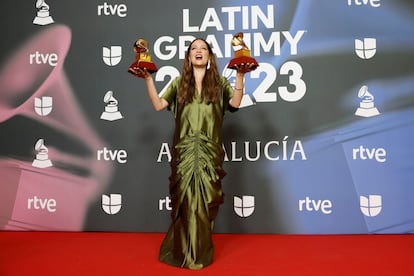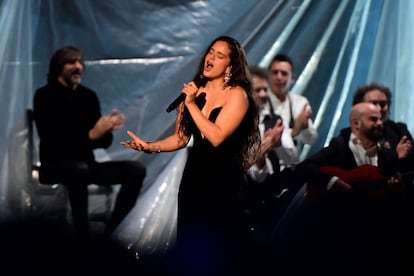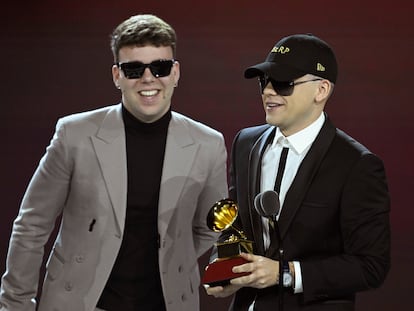Latin Grammys of Seville: Natalia Lafourcade sneaks into the urban genre party and Rosalía thrills on stage
Women took home the most important awards: the Mexican songwriter and the Colombians Shakira and Karol G won three each. Argentina’s Bizarrap also won three gramophones

Natalia Lafourcade crashed the party of the sublimation of the urban genre. The Mexican singer took home three Latin Grammys at the ceremony held this Thursday (singer-songwriter album, singer-songwriter song and recording of the year) for De todas las flores, of which she said: “It is my most personal album and I made it at a time when I felt completely broken. And the music taught me...”. That album, indeed, produces an intoxicating spiritual healing for everyone who listens to it. Despite the overwhelming presence of urban music at the ceremony, the awards for Lafourcade show that part of the industry appreciates other, perhaps more sensitive, approaches. The other triumphant winners of the night, also with three gramophones, were Shakira (best urban fusion/performance, best pop song and song of the year), Karol G (album of the year, best urban music album and best urban fusion/performance) and Bizarrap (best song of the year with Shakira, pop song with Shakira and best urban song with Quevedo). The 24th annual gala took place in Seville, Spain, making it the first time it was held outside the United States.
But the artist who shone the most on stage was Rosalía. With poise and stature, flying over the Palacio de Exposiciones y Congresos convention center of Seville, always with a bird’s eye view, observing, but doing her own thing. Rosalía came out first and transformed the Latin Grammy gala in Seville. The Catalan singer built bridges with an imaginary translucent membrane and enveloped the crowd with a performance of high emotional power. She chose Se nos rompió el amor, which the maestro Manuel Alejandro wrote for Rocío Jurado, one of the top-selling Spanish singers of all time, a woman who lived in a permanent state of emotional turbulence, but who still came through as a dominating force until her death in 2006. It was a totally meditated choice of songs by the creator of Motomami. Rosalía did not win any awards (she was only eligible for one), but she was one of the artists who shone the brightest on stage. Also Bizarrap, who staged three of his Sessions with a playful, modern and colorful flavor to demonstrate that he is the undisputed music producer of the moment.

Rosalía sang well, gripped by sorrow. Did she cry? It is possible. She did it on the International Day of Flamenco, November 16. And above all she showed that within that resounding modernity of hers (or maybe because of it) what she carries inside is a brave folklorist, willing to surrender to the art from the depth of her guts. Wearing a black dress, as if in mourning, Rosalía sang with a dagger in her heart. She was accompanied by a large flamenco group of guitarists and palmeros (clappers), all on plastic props, creating that image between tradition (flamenco) and pop (plastic) that makes up the essence of this artist.
The Argentine Bizarrap selected three of his most popular Sessions, but gave them a twist. The first one was performed with that lyrical talent that is Milo J, only 16 years old, full of colors and optimism. The surprise came with the second, a Quédate without Quevedo, who was replaced by a strong singer and a tango rhythm. It was spectacular. And the third, his famous collaboration with Shakira, with the Colombian singer unleashed on stage.
Rosalía and Bizarrap had a relatively easy time standing out, because the rest of the performers were conservative, not to say stingy, in a ceremony that was at times boring and with continuous stops. Most of those who stepped on the stage opted for their best known singles or their latest harvest. Shakira, scored extra points, performing in two parts of the gala. The Colombian performer, however, bordered on absurdity when, in an inane Acróstico, she introduced a video recording of her two children singing. And the kids were also in the audience, with their little white shorts.
The gala demonstrated the pending subject for young urban artists: most of them do not have optimal vocal conditions. The Colombian Sebastián Yatra, the Mexican Peso Pluma or the Puerto Rican Rauw Alejandro found it difficult to get their interpretations off the ground with an open microphone and without the use of playback. If you’re wondering why 80% of those performing at the main gala were from the urban genre you only have to look at the list of the most listened to on Spotify; these are commercial awards, what did you expect?

The flamenco number that was announced to celebrate the Day of Flamenco, was relegated to the pregala, where about 40 awards were given, few of the categories considered important. It was not seen in the broadcast, and it was a pity, because it had its substance. It began with the sound of a furnace to give a rancid tone to Israel Fernández and Niña Pastora, who sang with depth and strength. There was morbid curiosity to see how Omar Montes, also one of the nominees, would fit in. And he did not do badly. Accompanied by a brass section, Montes went into a slightly Mexicanized Ketama mode and, despite his short voice, he held his own. This kid has something (probably a lot of nerve) and it’s going to be difficult to shake his morale by putting him in front of purist tenets.
At the main gala, a memory of flamenco emerged, certainly insufficient and presented by artists little involved with the genre, such as David Bisbal and Paz Vega. “Flamenco is the Spanish music that is heard the most in the world,” we learned from the man from Almería while images of deceased flamenco artists such as Paco de Lucía, Enrique Morente, Lola Flores or Camarón were played in the background. No, it wasn't the best idea.
Seeing Quevedo and Bizarrap on stage collecting an award produced warm feelings. Two young men who, from humble backgrounds (especially Quevedo, from Spain’s Canary Islands) and in the solitude of their room at home, have already produced a generational anthem like Quédate (Bzrp Music Sessions, Vol. 52), which won the award for best Urban Song. The image of the two, behaving with that refreshing naivety of those who have rarely set foot on these royal stages, was touching. “Yes, you can come out of nowhere and fulfill a dream,” said Quevedo and one could not agree more.
But in the end, the biggest smile was Natalia Lafourcade’s, who unexpectedly found a place in a Grammys that have surrendered to urban music.
Sign up for our weekly newsletter to get more English-language news coverage from EL PAÍS USA Edition
Tu suscripción se está usando en otro dispositivo
¿Quieres añadir otro usuario a tu suscripción?
Si continúas leyendo en este dispositivo, no se podrá leer en el otro.
FlechaTu suscripción se está usando en otro dispositivo y solo puedes acceder a EL PAÍS desde un dispositivo a la vez.
Si quieres compartir tu cuenta, cambia tu suscripción a la modalidad Premium, así podrás añadir otro usuario. Cada uno accederá con su propia cuenta de email, lo que os permitirá personalizar vuestra experiencia en EL PAÍS.
¿Tienes una suscripción de empresa? Accede aquí para contratar más cuentas.
En el caso de no saber quién está usando tu cuenta, te recomendamos cambiar tu contraseña aquí.
Si decides continuar compartiendo tu cuenta, este mensaje se mostrará en tu dispositivo y en el de la otra persona que está usando tu cuenta de forma indefinida, afectando a tu experiencia de lectura. Puedes consultar aquí los términos y condiciones de la suscripción digital.









































